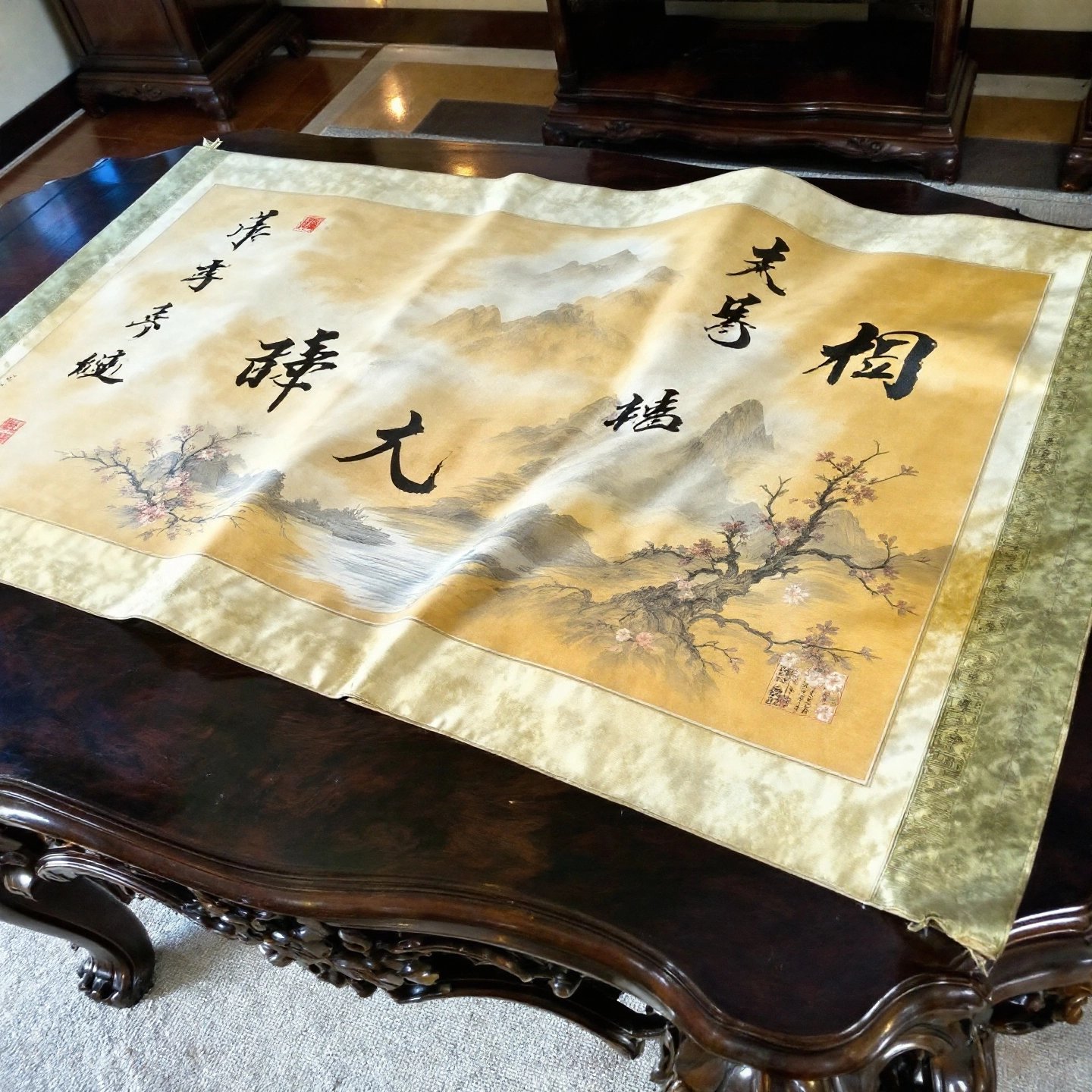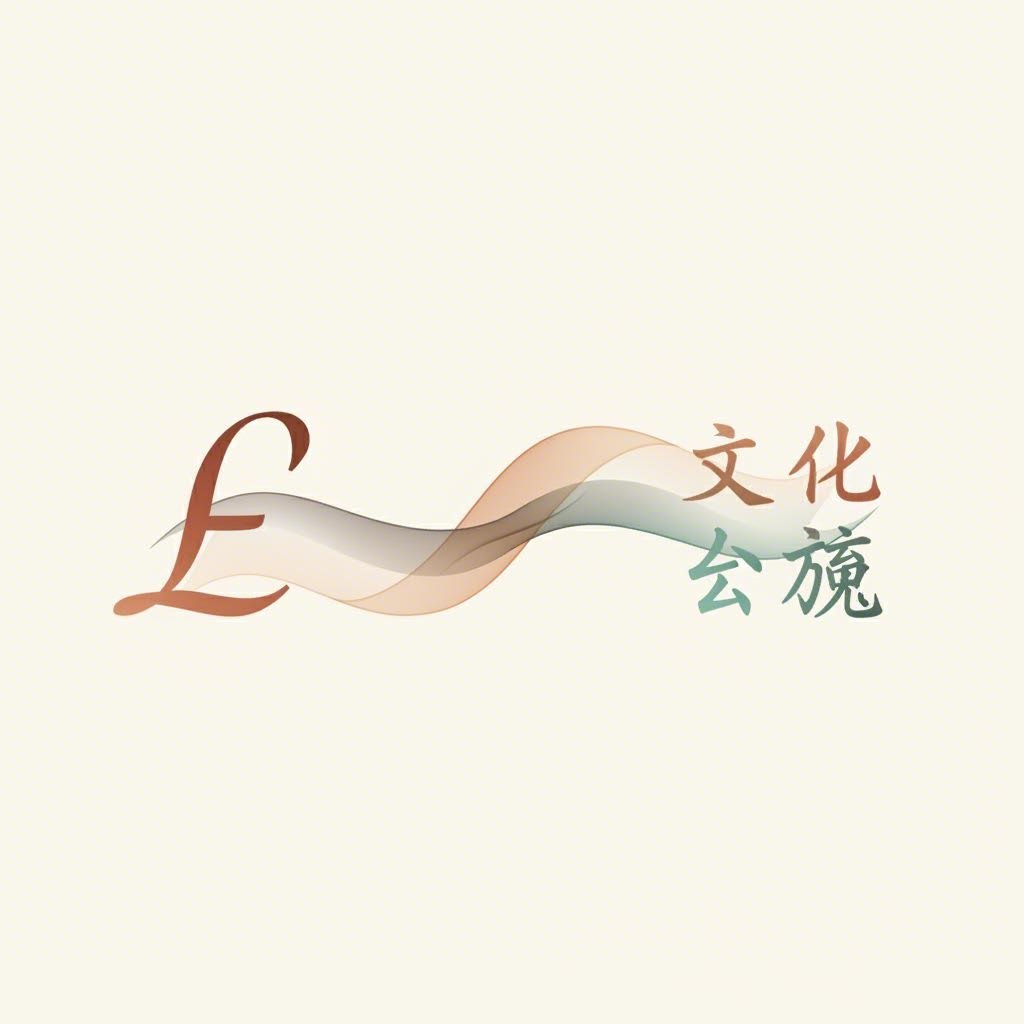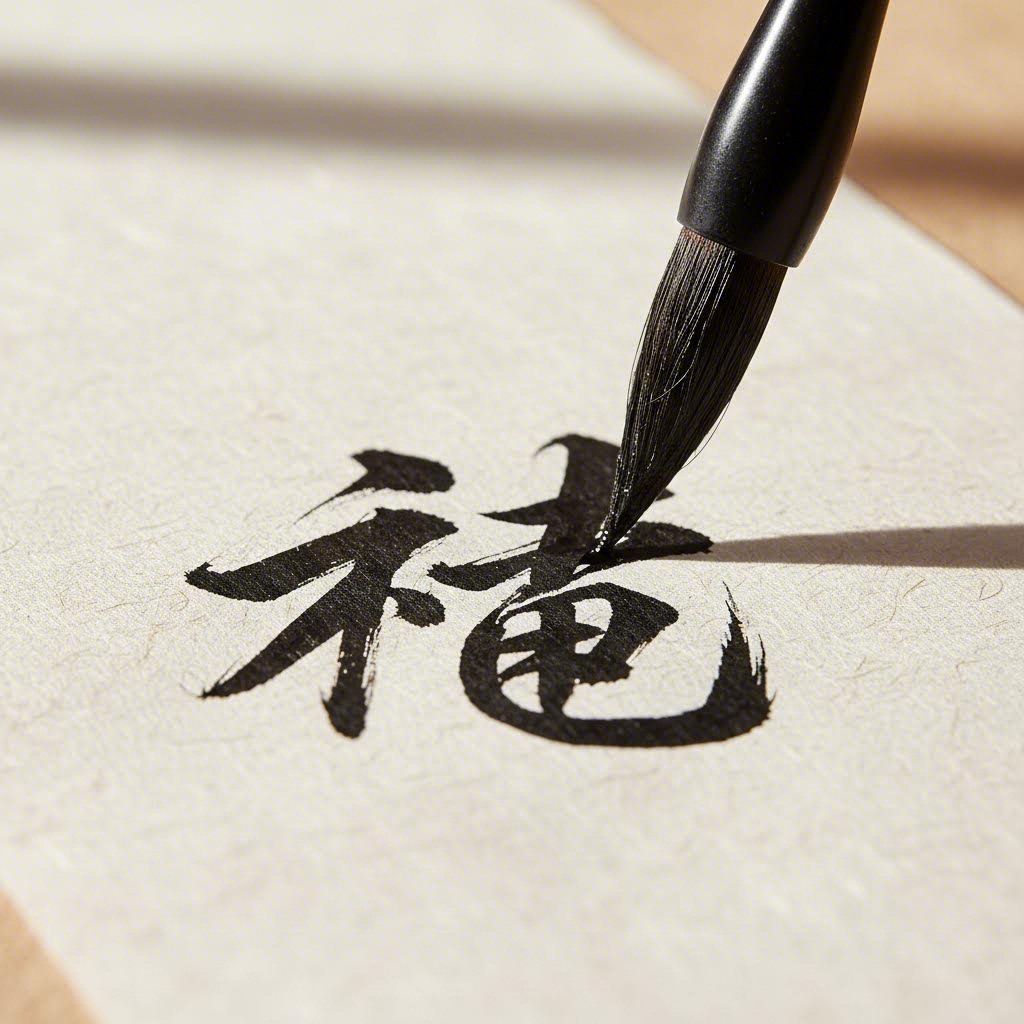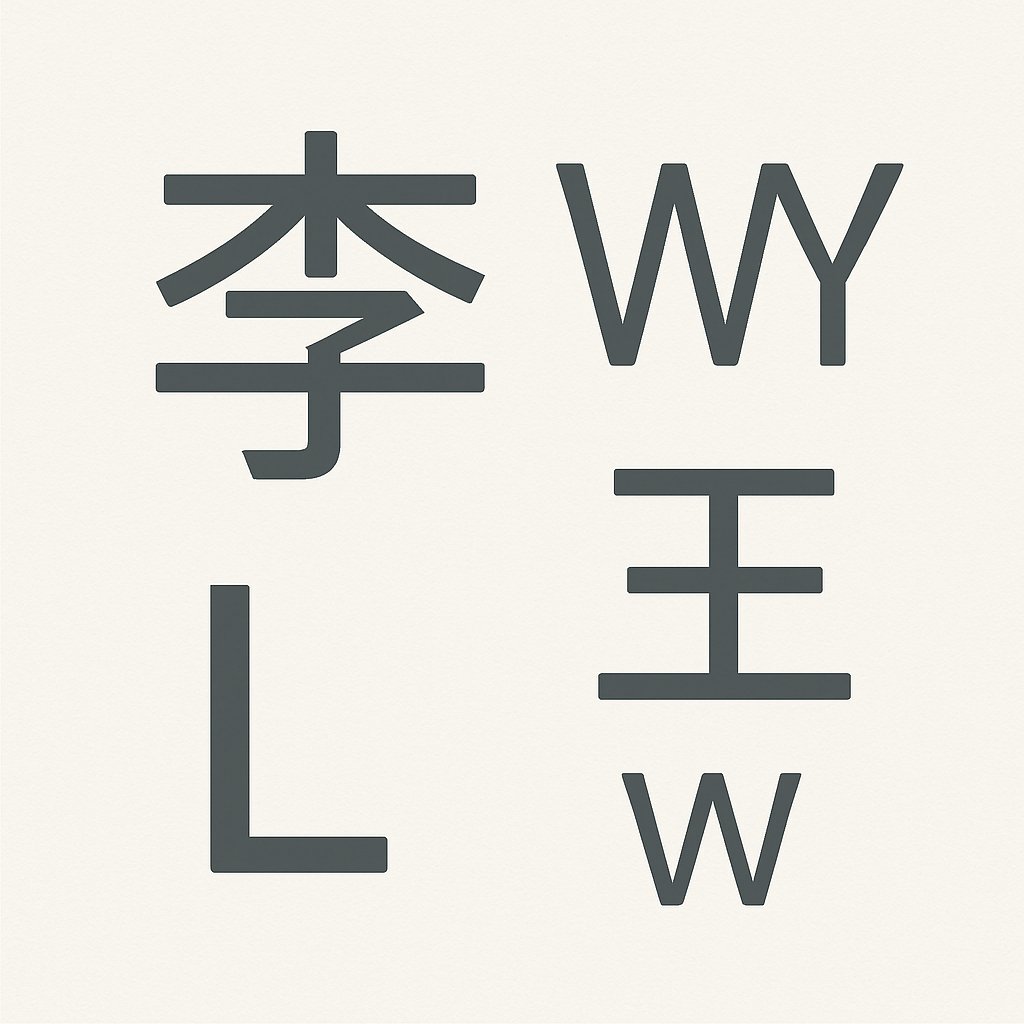Introduction to Chinese Family Names and Their Meanings
Have you ever wondered about the story behind your last name? In China, family names are more than just identifiers—they are a window into a rich tapestry of history, culture, and identity. With a history spanning over 4,000 years, Chinese surnames hold the key to understanding ancestral heritage and societal evolution. These names serve as a bridge connecting modern individuals to their roots, offering insights into migration patterns, clan histories, and even ancient legends.
Chinese surnames, or xìng (姓), are deeply intertwined with the country's cultural fabric. Unlike Western naming conventions, where documentation was often maintained by central authorities, Chinese families and clans preserved their own records. This makes surnames a crucial starting point for uncovering family history. For instance, the legendary Yellow Emperor is said to have ordered the adoption of hereditary family names as early as the third millennium BC, laying the foundation for a system that would evolve over millennia.
Today, there is a growing global interest in Chinese surnames, driven by cultural appreciation and genealogy research. Whether you're tracing your ancestry or simply curious about the meanings behind these names, exploring Chinese family names offers a fascinating journey through time. From the classic Hundred Family Surnames text to regional variations and modern trends, each name carries a unique story waiting to be discovered.
In this article, we’ll delve into the origins, meanings, and modern relevance of Chinese surnames. You’ll learn about the most common names like Wang (王), Li (李), and Zhang (张), as well as rare regional and minority surnames. By the end, you’ll have a deeper appreciation for how these names reflect China’s history and cultural diversity. Ready to uncover the secrets behind Chinese family names? Let’s begin!

Historical Origins of Chinese Surnames
Did you know that Chinese surnames have roots stretching back over 3,000 years? The earliest surnames, known as xìng (姓), emerged during China’s matriarchal clan societies. These names often contained the radical for "female" (女), such as Ji (姬) and Jiang (姜), reflecting their connection to maternal lineages. Over time, the system evolved to include shì (氏), which denoted branch lineages or noble titles. Together, these two systems laid the foundation for modern Chinese surnames.
From Clans to Hereditary Names
Initially, surnames were exclusive to the ruling elite and aristocratic families. The distinction between xìng and shì blurred during the Warring States period (475–221 BCE), when the Qin dynasty standardized naming practices. Commoners began adopting hereditary surnames, and shì gradually merged into xìng. By the Han dynasty (206 BCE–220 CE), the system we recognize today—where family names precede given names—was firmly established.
Key Historical Influences
Several dynasties played pivotal roles in shaping surname distribution:
- Zhou Dynasty (1046–256 BCE): Nobles used surnames to trace ancestry and assert political legitimacy.
- Qin Dynasty (221–206 BCE): Centralized reforms made surnames universal, breaking aristocratic monopolies.
- Tang Dynasty (618–907 CE): Genealogical records (pudie) documented clan histories, reinforcing surname identity.
Fun fact: The legendary Yellow Emperor, said to have introduced surnames, awarded the name Zhang (张) to a grandson who invented the bow and arrow—symbolizing the character’s meaning of "drawing a bow."
As we’ll see in the next chapter, the Hundred Family Surnames text later codified these naming traditions, preserving their legacy for future generations.
The 'Hundred Family Surnames' and Their Legacy
Ever wondered how Chinese surnames were preserved and passed down through generations? The answer lies in the Hundred Family Surnames (百家姓), a classic text compiled during the Song dynasty (960–1279). This rhyming poem, listing 504 surnames, became one of China’s most influential educational tools, alongside the Three Character Classic and Thousand Character Classic. Together, these texts formed the San Bai Qian (Three, Hundred, Thousand), the foundation of traditional Chinese literacy.
Cultural Significance and Educational Role
The Hundred Family Surnames wasn’t just a list—it was a cultural cornerstone. Memorized by generations of students, it introduced roughly 2,000 characters, essential for reading and writing. The text’s order reflected societal hierarchy: the first four surnames—Zhao (赵), Qian (钱), Sun (孙), and Li (李)—honored the Song emperors and regional rulers. For example:
- Zhao (赵): The imperial surname of the Song dynasty.
- Qian (钱): Rulers of the Wuyue kingdom.
- Sun (孙): The queen of Wuyue’s last king.
Notable Surnames and Their Meanings
The text also highlighted names with rich symbolism. Here are a few examples:
| Surname | Meaning |
|---|---|
| Wang (王) | "King" or "monarch" |
| Zhang (张) | "To draw a bow," linked to archery |
| Liu (刘) | Derived from a tool for harvesting |
Double-character surnames, like Ouyang (欧阳) and Zhuge (诸葛), were grouped at the end, preserving their unique cultural identities. Today, the text remains a testament to China’s naming heritage, with 90% of modern surnames traceable to its pages.
As we’ll explore next, these surnames aren’t just historical relics—they continue to shape China’s demographic landscape, with some names shared by millions.
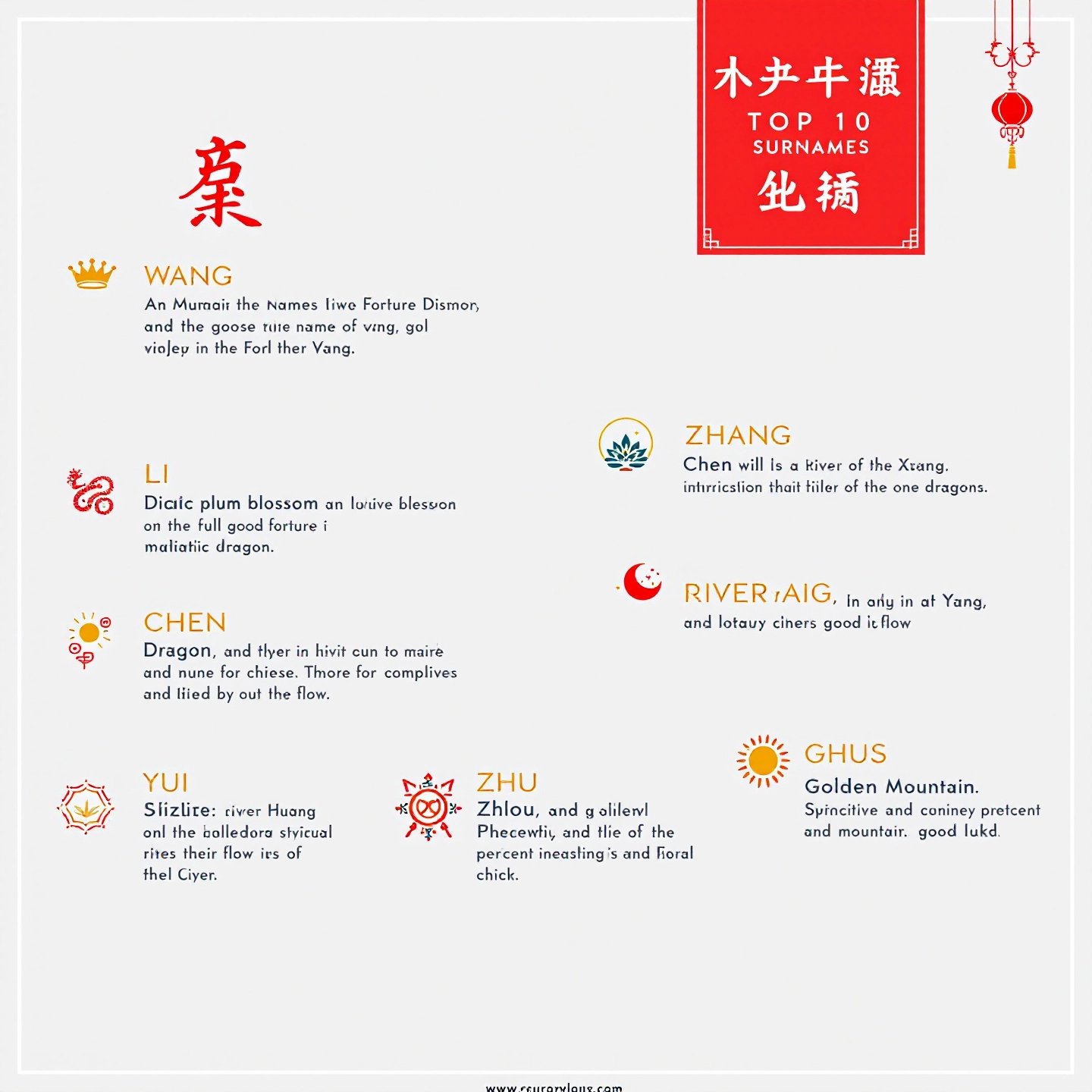
Most Common Chinese Surnames and Their Meanings
Did you know that just three surnames—Wang, Li, and Zhang—are shared by over 300 million people in China? These names dominate the demographic landscape, reflecting centuries of cultural and historical evolution. Let’s explore the top Chinese surnames, their meanings, and why they’ve endured through generations.
The Big Three: Wang, Li, and Zhang
According to China’s Ministry of Public Security, these are the most common surnames as of 2020:
- Wang (王): Meaning "king" or "monarch," this surname is borne by 7.25% of the population (92.8 million people). Its prevalence traces back to royal clans and nobility during the Zhou Dynasty.
- Li (李): Translating to "plum tree," Li is shared by 7.19% (92 million). It gained prominence during the Tang Dynasty, when the imperial family elevated its status.
- Zhang (张): Meaning "to draw a bow," Zhang accounts for 6.83% (87.5 million). Legend ties it to the invention of archery, symbolizing strength and precision.
Top 10 Chinese Surnames: Meanings and Prevalence
| Surname | Character | Meaning | Population Share |
|---|---|---|---|
| Wang | 王 | King | 7.25% |
| Li | 李 | Plum tree | 7.19% |
| Zhang | 张 | To draw a bow | 6.83% |
| Liu | 刘 | Ancient tool | 5.38% |
| Chen | 陈 | To exhibit | 4.53% |
| Yang | 杨 | Willow tree | 3.08% |
| Huang | 黄 | Yellow (color) | 2.23% |
| Zhao | 赵 | To hurry | 2.05% |
| Wu | 吴 | Ancient state | 1.93% |
| Zhou | 周 | Circular | 1.64% |
Cultural Significance
These surnames aren’t just identifiers—they’re cultural artifacts. For example:
- Liu (刘): Associated with the Han Dynasty’s founding emperor, Liu Bang, this name symbolizes resilience and leadership.
- Chen (陈): Derived from an ancient state, it reflects territorial roots and clan loyalty.
- Zhao (赵): As the first surname in the Hundred Family Surnames, it honors the Song Dynasty’s imperial lineage.
Together, these top 10 surnames account for nearly 40% of China’s population, illustrating how deeply they’re woven into the nation’s identity. Next, we’ll explore how regional and minority surnames add even more diversity to this rich tapestry.
Regional Variations and Minority Surnames
Did you know that Chinese surnames can reveal where a person's ancestors likely lived? Just as dialects and customs vary across China, so do surnames. From the bustling cities of Guangdong to the mountainous regions of Yunnan, regional naming trends offer a fascinating glimpse into China's diverse cultural landscape. Let’s explore how geography and ethnicity shape these distinctive family names.
North vs. South: A Tale of Two Surname Trends
China’s vast territory has led to striking regional differences in surname distribution. For example:
- Northern China: Dominated by Wang (王), Li (李), and Zhang (张), which together account for over 20% of the population. These names reflect historical migration patterns and the influence of imperial capitals like Beijing.
- Southern China: Chen (陈) reigns supreme, particularly in Fujian and Guangdong provinces. This surname is often romanized as Chan in Cantonese-speaking regions like Hong Kong.
- Yangzi River Region: A melting pot where Li (李) is most common, blending northern and southern naming traditions.
Ethnic Minority Surnames: A Mosaic of Cultures
China’s 55 recognized ethnic minorities have enriched the surname pool with unique names and traditions:
| Ethnic Group | Example Surnames | Cultural Significance |
|---|---|---|
| Manchu | Aixinjueluo (爱新觉罗), Nara (那拉) | Former Qing dynasty royalty; some adopted Han surnames like Jin (金) |
| Yi (Yunnan) | Lunalouyugumuzheshuduotumuku'adebu'axi (鲁纳娄于古母遮熟多吐母苦啊德补啊喜) | Possibly the longest surname in the world with 17 characters |
| Hui (Muslim) | Ma (马), Na (纳) | Often derived from Arabic names like Muhammad (Ma) or Nasruddin (Na) |
Rare Regional Surnames
Some surnames are concentrated in specific areas:
- Tu (塗): Primarily found in Taiwan, this name doesn’t appear in the classic Hundred Family Surnames.
- Xiao (萧) vs. Xiao (肖): Simplified character mergers in mainland China created new surname variants rare in Hong Kong and Taiwan.
- Fong (方): A Cantonese variant of Fang that’s unusually common in San Francisco’s Chinatown due to early immigrant clusters.
These regional and minority surnames remind us that Chinese identity is far from monolithic. Just as the next chapter will reveal how characters form these names, these variations show how history, migration, and cultural exchange have shaped China’s naming traditions.
The Structure and Formation of Chinese Surnames
Have you ever looked at a Chinese surname and wondered how its character was chosen? Unlike alphabetic surnames, Chinese family names are built from hanzi (characters), each carrying distinct phonetic and semantic meanings. These characters aren’t random—they reflect ancestral trades, geographic origins, or even moral virtues. Let’s decode how these names are constructed and why their components matter.
Character Selection: More Than Just a Name
Chinese surnames typically derive from:
- Occupations: Like Zhang (张), meaning "to stretch a bow," tied to archery.
- Natural Elements: Such as Lin (林, "forest") or Shan (山, "mountain").
- Clan Identifiers: Ancient xing (姓) often included the "female" radical (女), like Ji (姬).
Phonetics vs. Semantics: A Delicate Balance
Each character combines:
| Aspect | Role | Example |
|---|---|---|
| Phonetic | Dictates pronunciation | Li (李) and Li (黎) sound identical but differ in meaning. |
| Semantic | Conveys meaning | Wang (王) uses the "jade" radical (玉) to symbolize royalty. |
Fun fact: Some surnames, like Ouyang (欧阳), retain ancient two-character structures, preserving historical clan distinctions.
Symbolism in Strokes
Even a character’s stroke count can hold significance:
- 8 Strokes: Considered lucky (e.g., Zhou 周).
- Complex Characters: Rare surnames like Zhuge (诸葛) often denote noble lineages.
Next, we’ll explore how dynastic changes and migrations further shaped these names, revealing why some surnames dominate while others nearly vanished.
Influence of Dynasties and Historical Events on Surnames
Did you know that China's imperial dynasties didn't just shape politics—they also transformed surnames? From royal decrees to mass migrations, historical events left an indelible mark on Chinese family names. Let's explore how power shifts and population movements reshaped surnames across millennia.
Dynastic Imprints on Surname Distribution
Key dynasties that redirected surname evolution:
- Zhou Dynasty (1046–256 BCE): Established the fengjian system, where nobles like the Ji (姬) clan spread surnames through enfeoffed territories. Over 60% of modern surnames trace back to Zhou-era nobility.
- Qin Dynasty (221–206 BCE): Emperor Qin Shi Huang's centralization policies forced conquered states' elites to adopt location-based surnames (e.g., Qi 齐 from the Qi state).
- Tang Dynasty (618–907 CE): The imperial Li (李) family elevated their surname's status—today, 92 million Chinese share this name.
War and Migration: Catalysts for Change
Historical upheavals triggered surname adaptations:
| Event | Period | Surname Impact |
|---|---|---|
| An Lushan Rebellion | 755–763 CE | Northern refugees brought Wang (王) surnames southward |
| Mongol Conquest | 1271–1368 | Some Han Chinese adopted Mongolian surnames like Borjigin (later sinicized as Bao 包) |
| Hakka Migrations | 12th–19th c. | Created distinct southern clusters of Chen (陈) and Lin (林) surnames |
Case Study: The Zhao (赵) Phenomenon
This surname's trajectory illustrates dynastic influence:
- Rose to prominence during Song Dynasty (960–1279) as the imperial family name
- Post-dynasty collapse, many Zhao descendants migrated to Shanxi and Hebei
- Today, 2.05% of Chinese bear this name—a direct legacy of Song-era prestige
As we'll see next, these historical forces continue echoing in modern naming trends, from hyphenated surnames to gender-neutral naming practices.

Modern Trends in Chinese Surnames
Have you noticed how Chinese surnames are evolving in the 21st century? Gone are the days when patrilineal naming was the only option. Today, modern Chinese families are rewriting tradition with hyphenated surnames, maternal lineage choices, and even creative new combinations. These shifts reflect broader societal changes—from gender equality movements to globalization’s cultural blending. Let’s unpack the trends reshaping Chinese surnames today.
Breaking Tradition: Hyphenation and Maternal Surnames
Recent studies reveal fascinating shifts in naming practices:
- Compound Surnames: Couples increasingly combine names, like Zhang-Li (张李), symbolizing equal family representation. Urban educated families lead this trend, especially where wives have no brothers (Sixth Tone).
- Matrilineal Choices: In eastern provinces like Zhejiang, 18% of children now take their mother’s surname, often when the father’s socioeconomic status is lower.
- Legal Flexibility: Since 2020, China’s Civil Code allows children to inherit either parent’s surname—or a combination—without bureaucratic hurdles.
Global Influences and Hybrid Identities
As Chinese diaspora communities grow, so do cross-cultural naming innovations:
| Trend | Example | Cultural Significance |
|---|---|---|
| Western-Chinese Blends | Emma Wang (王艾玛) | Balances global accessibility with heritage |
| Character Adaptations | Using 丽 (Lì, "beautiful") for daughters | Modernizes traditional virtue names |
Tools for Heritage Exploration
Curious about your own Chinese surname roots? Digital tools like the Chinese Name Generator offer:
- AI-Powered Suggestions: Culturally authentic names based on historical data
- Meaning Breakdowns: Explains characters like 王 ("king") or 李 ("plum tree")
- Regional Variants: Highlights how a surname might differ in Cantonese vs. Mandarin
These changes aren’t just personal—they’re reshaping China’s demographic landscape. As we’ll explore next, surnames remain vital threads connecting modern identities to ancestral legacies.
Preserving Heritage: The Role of Surnames in Chinese Culture
What’s in a name? For Chinese families, surnames are more than identifiers—they’re living threads connecting generations to their ancestral roots. In a rapidly modernizing world, these names serve as cultural anchors, preserving histories that might otherwise fade. From ancient clan records to contemporary genealogy tools, the journey of Chinese surnames reflects a deep-seated reverence for heritage.
The Cultural Tapestry of Surnames
Chinese surnames function as:
- Lineage Markers: Over 80% of Chinese surnames trace back to just 100 clans, creating shared identities across millions (FamilySearch).
- Historical Archives: Names like Kong (孔) instantly evoke Confucius’ legacy, while Zheng (郑) recalls the maritime explorer Zheng He.
- Cultural Bridges: Diaspora communities use surnames to maintain ties—think of Malaysia’s Tan (陈) or Peru’s Chung (钟).
Modern Tools for Ancestral Connection
Today, digital platforms like the Chinese Name Generator democratize heritage exploration by offering:
| Feature | Benefit |
|---|---|
| AI-Curated Names | Generates authentic combinations like Li Wei (李伟) with cultural context |
| Character Breakdowns | Explains meanings (e.g., 王 as "king") and regional pronunciations |
| Historical Insights | Links surnames to dynastic origins or migration patterns |
Imagine discovering your surname’s ancient ties to a Tang Dynasty general or a Zhou-era philosopher—these tools make such revelations accessible to anyone.
Why Preservation Matters
As China urbanizes, surname traditions face new challenges:
- Identity Continuity: 60% of young Chinese consider surnames vital to cultural belonging (Sixth Tone).
- Genealogical Gaps: Many diaspora families lack written records, making digital tools crucial for reconstruction.
- Gender Equity: Rising matrilineal surname choices expand heritage narratives beyond patrilineal lines.
Whether you’re researching your Chinese surname heritage or choosing a name for a newborn, these connections remind us that every character carries centuries of stories. As we conclude, consider how your own name—or one generated by tools like the Chinese Name Generator—might unlock doors to an extraordinary past.
Conclusion
Chinese family names are more than just identifiers—they are living testaments to a civilization's enduring legacy. From the ancient xìng clans to today's hyphenated surnames, these names have woven a 4,000-year tapestry of cultural identity, migration stories, and familial pride. As we've explored, each surname—whether shared by millions like Wang (王) or unique to minority groups like the Yi's 17-character marvel—carries profound historical weight and symbolic meaning.
In our modern era of globalization, these names continue evolving while maintaining their deep roots. Tools like the Chinese Name Generator now make it easier than ever to explore this heritage, whether you're researching ancestors or choosing a culturally rich name for a child. These digital resources democratize access to what was once privileged genealogical knowledge, allowing anyone to uncover how their surname might connect to Tang Dynasty poets or Zhou-era philosophers.
The global fascination with Chinese family names and meanings reflects a universal human desire to understand our place in history. As you reflect on the names discussed—from the imperial Zhao (赵) to the resilient Chen (陈)—consider how your own surname, Chinese or otherwise, carries untold stories. Perhaps it's time to trace your lineage or use modern tools to gift a meaningful name to the next generation. After all, in the words of a Chinese proverb: "To know your surname is to know your mountain"—the ancestral foundation that elevates your view of the world.
Frequently Asked Questions About Chinese Family Names
1. Do Chinese family names have meanings?
Yes, Chinese family names often carry deep meanings tied to history, occupations, or natural elements. For example, 'Wang' (王) means 'king,' while 'Li' (李) translates to 'plum tree.' These names reflect ancestral heritage and cultural values.
2. Which is the top 1 Chinese family name?
The most common Chinese surname is 'Wang' (王), meaning 'king' or 'monarch,' shared by over 92 million people in China. It traces back to royal clans during the Zhou Dynasty.
3. How do Chinese family names work?
Chinese family names are hereditary and precede given names. Unlike Western traditions, women often retain their maiden names. Surnames like 'Zhang' (张) or 'Liu' (刘) connect individuals to ancestral clans and regional histories.
4. What is the 'Hundred Family Surnames' text?
Compiled during the Song Dynasty, this classic text lists 504 surnames and was used to teach literacy. It reflects historical hierarchies, with names like 'Zhao' (赵) honoring imperial lineages.
5. Are there regional variations in Chinese surnames?
Absolutely. Surnames like 'Chen' (陈) dominate southern China, while 'Wang' (王) is prevalent in the north. Ethnic minorities also have unique names, such as the Yi people's 17-character surname.
